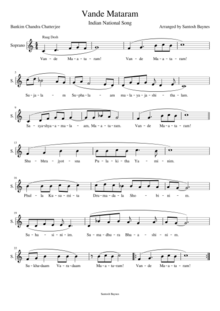
Back বন্দে মাতৰম্ Assamese बंदे मातरम् Bihari বন্দে মাতরম্ Bengali/Bangla ڤاندێ ماتەرەم CKB ވަންދޭ މާތަރަމް DV Vande Mataram Spanish Vande Mataram Basque Vande Mataram Finnish Vande mataram French વંદે માતરમ્ Gujarati
 Vande Mataram written by Bankim Chandra Chatterjee set to Raag Desh as performed on All India Radio | |
National song of India | |
| Lyrics | Bankim Chandra Chatterjee, Anandamath (1882) |
|---|---|
| Music | Jadunath Bhattacharya (original) Hemanta Mukherjee (film version) |
| Adopted | 24 January 1950 |
| Audio sample | |
Vande Mataram played on the Mohan veena by Vishwa Mohan Bhatt in 2017 | |
Vande Mataram (Vande Mātaram, also spelt Bande Mataram; Bônde Mātôrôm; transl. I praise you, Motherland) is a poem written in Sanskrit and Sanskritised Bengali[1][2] by Bankim Chandra Chatterjee in the 1870s.[3][4] The first two verses of the poem were adopted as the National Song of India in October 1937 by the Congress.[5][6][7]
The poem was first published in 1882 as part of Chatterjee's Bengali novel Anandmath.[8] It is an ode to the motherland, personified as the "mother goddess" in later verses, of the people. This initially referred to Bengal, with the "mother" figure therefore being Banga Mata (Mother Bengal), though the text does not mention this explicitly.[9][10][11][12] Indian nationalist and philosopher Sri Aurobindo referred Vande Mataram as the "national Anthem of Bengal".[13]
Nonetheless, the poem played a vital role in the Indian independence movement. It first gained political significance when it was recited by Rabindranath Tagore at Congress in 1896.[14][15][16] By 1905, it had become a popular amongst political activists and freedom fighters as a marching song.[16] The song, as well as Anandmath, were banned under British colonial rule under threat of imprisonment, making its use revolutionary. The ban was ultimately overturned by the Indian government upon independence in 1947.[17][18]
On 24 January 1950, the Constituent Assembly of India adopted Vande Mataram as the Republic's national song. President of India Rajendra Prasad stated that the song should be honoured equally with the national anthem of India, Jana Gana Mana.[19] While the Constitution of India does not make reference to a "national song",[20][21] the Government filed an affidavit at the Delhi High Court in November 2022 stating that Jana Gana Mana and Vande Mataram would “stand on the same level”, and that citizens should show equal respect to both.[22]
The first two verses of the song make abstract reference to the "mother" and "motherland", without any religious connotation. However, later verses mention Hindu goddesses such as Durga.[23][24]
Unlike the national anthem, there are no rules or decorum to be observed when reciting Vande Mataram.[25]
- ^ https://knowindia.india.gov.in/national-identity-elements/national-song.php
- ^ "Vande Mataram". www.mustrad.org.uk. Retrieved 3 September 2021.
- ^ "National Identity Elements - National Song - Know India: National Portal of India". knowindia.gov.in. Archived from the original on 18 August 2017. Retrieved 24 July 2021.
- ^ Staff Reporter (14 July 2017). "Vande Mataram was in Sanskrit, AG clarifies". The Hindu. ISSN 0971-751X. Retrieved 24 July 2021.
- ^ Cite error: The named reference
gandhi1939vmwas invoked but never defined (see the help page). - ^ Sabyasachi Bhattacharya (2003). Bande Mataram, the Biography of a Song. Penguin Books. pp. 17–24. ISBN 978-0-14-303055-3.
- ^ S. K. BOSE (2015). Bankim Chandra Chatterji. Publications Division Ministry of Information & Broadcasting. pp. 88–92. ISBN 978-81-230-2269-7.
- ^ Sabyasachi Bhattacharya (2003). Bande Mataram, the Biography of a Song. Penguin. pp. 1–8, 73–76, 90–99. ISBN 978-0-14-303055-3.
- ^ "Bankim's Vande Mataram originally referred to Banga Mata not Bharat Mata: Netaji's grand nephew in new book".
- ^ "The Mother in Bande Mataram is not Mother India". 8 April 2017.
- ^ "History revisited: 'Bande Mataram' was written as a song about Bengal – not India".
- ^ "Bharat Mata: From freedom struggle metaphor to patriotism's litmus test". 21 March 2016.
- ^ Sri Aurobindo commented on his English translation of the poem, "It is difficult to translate the National Anthem of Bengal into verse in another language owing to its unique union of sweetness, simple directness and high poetic force." Cited in Bhabatosh Chatterjee (ed.), Bankim Chandra Chatterjee: Essays in Perspective, Sahitya Akademi, Delhi, 1994, p. 601.
- ^ "National Song of India". Government of India. Archived from the original on 15 January 2013. Retrieved 29 April 2008.
- ^ "National Song". knowindia.gov.in. Archived from the original on 18 August 2017.
- ^ a b Diana L. Eck (2012). India: A Sacred Geography. New York: Random House (Harmony Books). pp. 95–97. ISBN 978-0-385-53190-0.
- ^ Cite error: The named reference
Chatterji2005p71was invoked but never defined (see the help page). - ^ Aurobindo Mazumdar (2007). Bande Mataram and Islam. Mittal Publications. pp. 18–22, 30–31. ISBN 978-81-8324-159-5.
- ^ "National Symbols | National Portal of India". Retrieved 23 January 2020.
- ^ "HC dismisses plea to declare 'Vande Mataram' as national anthem or song". The Indian Express. 27 July 2019. Retrieved 1 November 2019.
- ^ "No concept of National Song in Constitution, says SC". Hindustan Times. 17 February 2017. Retrieved 1 November 2019.
- ^ "Jana Gana & Vande Mataram 'stand on same level': Govt in HC". Times of India. 7 November 2022. Retrieved 7 November 2022.
- ^ Sabyasachi Bhattacharya (2003). Bande Mataram, the Biography of a Song. Penguin Books. pp. 34–37, 81. ISBN 978-0-14-303055-3.
- ^ Sumathi Ramaswamy (2009). The Goddess and the Nation: Mapping Mother India. Duke University Press. pp. 125–142. ISBN 978-0-8223-9153-1.
- ^ "No rules on singing, playing of 'Bande Mataram': Government". The Times of India. Archived from the original on 12 February 2017. Retrieved 12 February 2017.
© MMXXIII Rich X Search. We shall prevail. All rights reserved. Rich X Search